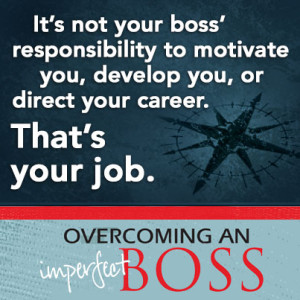Note from Jennifer: Last month, I interviewed Karin Hurt, author of Overcoming an Imperfect Boss: A Practical Guide to Building a Better Relationship With Your Boss. Karin had several great suggestions for people wishing to increase their career satisfaction and success. Here are four ideas that Karin shared on bettering the relationship you have with key people in your work life: your work team leader (“boss”), your direct reports and your peers. When you see the word “I” it’s Karen speaking. To see all of the posts related to this topic, click on the Imperfect Boss series.
 The career benefits of investing in your relationship with your boss
The career benefits of investing in your relationship with your boss
The main premise of this book is that you have a lot more power in your own career and in your own success than you may think. When I mentor people about their career, so many of them are frustrated by what they perceive as a weak relationship with their boss. They’ll say, “I wish my boss were different” or “I wish I worked for Person A, because he would really invest in my development, and instead I’ve got this turkey”. My response has always been, these are all things that are helping you become stronger. So if your boss is disengaged, then use that as an opportunity to really step up and be more strategic and be more creative. Learning how to navigate and work with a person and develop a fantastic relationship despite those ups and downs really teaches you a lot about working with people up, down and sideways [in the organization]. You are honing your emotional intelligence skills by being able to do that.
Karin’s advice for people with leadership aspirations
First, understand why it is that you want to lead. What kind of leader do you want to be? And then really think about your own leadership style:
- What are the things that you are good at, the gifts you that you bring to the table?
- How would that help you to draw others to a compelling vision?
- How can you help others find their strengths and apply them towards that vision?
- How would you encourage people to work better together?
Also, do not try to emulate somebody else’s leadership style entirely. I think it is always good to pick pieces of things that make you feel really good or really inspire you about other leaders; and to incorporate some of that into your leadership. I am constantly looking for people I think are doing it right and trying to figure out why it is working. But do not go so far as to think, “To be a leader, I have to be like this woman because she is a great leader and therefore I should lead exactly like her.” That’s a mistake that I see some folks make early in their career—that they think they have got to be like someone else in order to lead well.
Unfortunately, I think that is what drives some of the negative behaviors that trickle down. You know, if someone is leading through fear and intimidation and they are extremely successful, I think it is easy to think, well they got where they are because they lead with fear and intimidation. I’ve had people say that to me, and I think, oh no. They’re where they are despite that, and what you don’t see behind the scenes is the destruction that behavior inflicts.
Does the advice in this book work for somebody who doesn’t technically have a “boss” or someone in a supervisory kind of role?
Truly, the advice in the book works even better in peer-to-peer relations. Every one of these subjects works in those relationships, because I think we as human beings, we have tendency to do everything we can to please our boss. And what I find is the last skill set to emerge [in a professional’s career] is realizing that your peers are really your lifeline. So if you took all of these different topics [in the book] and then applied them to your peers, it would be powerful. So, you can replace the word “boss” with “peers”. For example, “How do I get my peers to trust me?” All those same techniques still apply. How do I persuade my peers? How do I give my peers bad news? I think all of these techniques are equally applicable in those arenas.
If you’re a leader watch out for negative “trickle-down effect” with your team
I have found through the years as a leader that I was letting my own frustrations with my boss (and there are always some even with the very best bosses) drive me crazy. I was in this constant juggling act of not letting my frustrations with my boss trickle down and impact my own leadership. And so I have found through the years that if people really concentrate on building a very strong relationship with their boss and investing in that relationship not only do you have a lot more power in controlling your end of that relationship and improving it; but also it makes you really question your own leadership style. You might realize the impact that you are likely having on the people that you are leading. I do believe that by investing in the relationship you have with your boss, you also are investing in your own leadership.
Disclosure: some of the links in this post are affiliate links, meaning if you click the link and make a purchase, I may receive a small commission. This does not increase the price of your purchase and I only recommend resources I think will be of value to my readers.
Leave a Reply